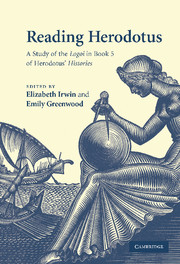Book contents
- Frontmatter
- Contents
- Acknowledgements
- List of contributors
- List of abbreviations
- Introduction: reading Herodotus, reading Book 5
- Chapter 1 ‘What's in a name?’ and exploring the comparable: onomastics, ethnography, and kratos in Thrace, (5.1–2 and 3–10)
- Chapter 2 The Paeonians (5.11–16)
- Chapter 3 Narrating ambiguity: murder and Macedonian allegiance (5.17–22)
- Chapter 4 Bridging the narrative (5.23–7)
- Chapter 5 The trouble with the Ionians: Herodotus and the beginning of the Ionian Revolt (5.28–38.1)
- Chapter 6 The Dorieus episode and the Ionian Revolt (5.42–8)
- Chapter 7 Aristagoras (5.49–55, 97)
- Chapter 8 Structure and significance (5.55–69)
- Chapter 9 Athens and Aegina (5.82–9)
- Chapter 10 ‘Saving’ Greece from the ‘ignominy’ of tyranny? The ‘famous’ and ‘wonderful’ speech of Socles (5.92)
- Chapter 11 Cyprus and Onesilus: an interlude of freedom (5.104, 108–16)
- Chapter 12 ‘The Fourth Dorian Invasion’ and ‘The Ionian Revolt’ (5.76–126)
- Bibliography
- Index locorum
- General index
Chapter 12 - ‘The Fourth Dorian Invasion’ and ‘The Ionian Revolt’ (5.76–126)
Published online by Cambridge University Press: 22 September 2009
- Frontmatter
- Contents
- Acknowledgements
- List of contributors
- List of abbreviations
- Introduction: reading Herodotus, reading Book 5
- Chapter 1 ‘What's in a name?’ and exploring the comparable: onomastics, ethnography, and kratos in Thrace, (5.1–2 and 3–10)
- Chapter 2 The Paeonians (5.11–16)
- Chapter 3 Narrating ambiguity: murder and Macedonian allegiance (5.17–22)
- Chapter 4 Bridging the narrative (5.23–7)
- Chapter 5 The trouble with the Ionians: Herodotus and the beginning of the Ionian Revolt (5.28–38.1)
- Chapter 6 The Dorieus episode and the Ionian Revolt (5.42–8)
- Chapter 7 Aristagoras (5.49–55, 97)
- Chapter 8 Structure and significance (5.55–69)
- Chapter 9 Athens and Aegina (5.82–9)
- Chapter 10 ‘Saving’ Greece from the ‘ignominy’ of tyranny? The ‘famous’ and ‘wonderful’ speech of Socles (5.92)
- Chapter 11 Cyprus and Onesilus: an interlude of freedom (5.104, 108–16)
- Chapter 12 ‘The Fourth Dorian Invasion’ and ‘The Ionian Revolt’ (5.76–126)
- Bibliography
- Index locorum
- General index
Summary
The Spartans are com–
The Persians are–-
The Athenians –
Crossing the line.
Here at this book's wind-up, pause to stop-start what we are doing, half-way between reading and reflection {no man's land}. In a rupturous moment that pulls drastically away from its narrated event so as to oblige attention to the project of narration, find a passage that ‘lies at the heart of the Histories in every way. It is placed very near the centre of the 9-book pedimental structure. As for its content’ – ἱστορ⋯τεον.
The build-up to the fanfare of 5.76 will mean circling round, criss-crossing lanes, shunting back and forth until §10. {ἱστορικ⋯ς;}
1. We have it coming to us. Read Herodotus. We must read Herodotus. What this prose epic wants and demands. So what call for writing does this monstrous invention posit or promulgate? What techno-logic (what dynamic?) harnesses all this feverish work, commands the onward march of these legion signs by the myriad? There are so many ‘great and marvellous feats to record, not least how come Greeks and non-Greeks warred on each other’ (Preface). This stylish polemological project is busy staking out a cosmos impelled by imperialist drives through isomorphism with its textual articulation, systematically interrogating humanity through conflict of narremes (dialectical clash, told as story). ‘Imperialism was a nomos.’ (T)history follows sovereign empires as they absorb, more than terrain, territories.
- Type
- Chapter
- Information
- Reading HerodotusA Study of the Logoi in Book 5 of Herodotus' Histories, pp. 289 - 310Publisher: Cambridge University PressPrint publication year: 2007
- 8
- Cited by

